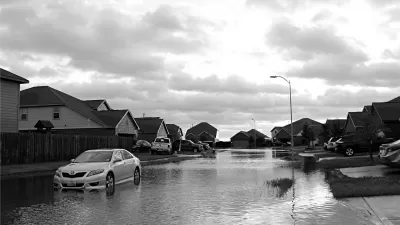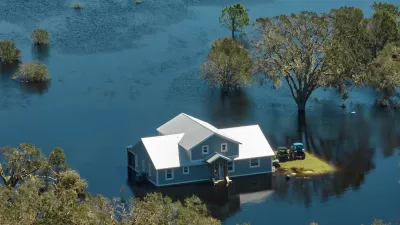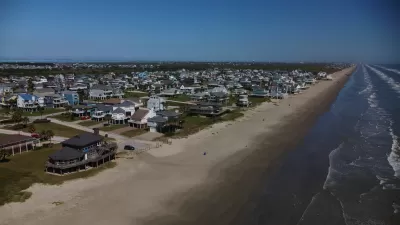Many U.S. cities use ‘routine’ practices like zoning changes and permitting to discourage development in high-risk flood zones.

New research published in the journal Earth’s Future shows that the United States is building fewer structures in floodplains, bucking conventional wisdom that development is running rampant in flood-prone areas, writes Jake Bittle in Grist. A separate paper found that some of the most effective approaches to limiting floodplain development are “routine municipal practices” such as zoning and permitting.
The results reveal that floodplain development is not the intractable problem some have made it out to be. “Developers have built 844,000 units of housing on 2.1 million acres of floodplain — but if they had chosen available parcels at random, they would have built even more than that. This was true for more than 75 percent of all jurisdictions studied, indicating that most governments make at least some substantive attempt to avoid coastlines and riverbanks.”
According to the study, “Indeed, in the 21st century most towns and cities in the U.S. built very little or not at all in flood-prone areas. The vast majority of floodplain construction — the kind that grabs headlines and feeds the pessimistic narrative — has taken place in just two states: Louisiana and Florida.”
Around half of properties that have filed multiple flood insurance claims are in Gulf of Mexico states. “The authors argue that these places need targeted intervention. The state or federal government could provide subsidies to encourage less risky construction, helping offset the economic lure of waterfront construction, or a state could just impose penalties on cities that allow for new builds near the water.”
FULL STORY: The US is finally curbing floodplain development, new research shows

Alabama: Trump Terminates Settlements for Black Communities Harmed By Raw Sewage
Trump deemed the landmark civil rights agreement “illegal DEI and environmental justice policy.”

Study: Maui’s Plan to Convert Vacation Rentals to Long-Term Housing Could Cause Nearly $1 Billion Economic Loss
The plan would reduce visitor accommodation by 25% resulting in 1,900 jobs lost.

Planetizen Federal Action Tracker
A weekly monitor of how Trump’s orders and actions are impacting planners and planning in America.

Wind Energy on the Rise Despite Federal Policy Reversal
The Trump administration is revoking federal support for renewable energy, but demand for new projects continues unabated.

Passengers Flock to Caltrain After Electrification
The new electric trains are running faster and more reliably, leading to strong ridership growth on the Bay Area rail system.

Texas Churches Rally Behind ‘Yes in God’s Back Yard’ Legislation
Religious leaders want the state to reduce zoning regulations to streamline leasing church-owned land to housing developers.
Urban Design for Planners 1: Software Tools
This six-course series explores essential urban design concepts using open source software and equips planners with the tools they need to participate fully in the urban design process.
Planning for Universal Design
Learn the tools for implementing Universal Design in planning regulations.
Caltrans
Smith Gee Studio
Institute for Housing and Urban Development Studies (IHS)
City of Grandview
Harvard GSD Executive Education
Toledo-Lucas County Plan Commissions
Salt Lake City
NYU Wagner Graduate School of Public Service





























